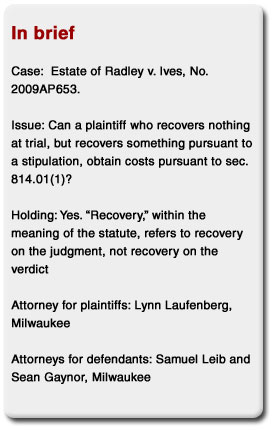Court costs can be recovered after stipulation
By: David Ziemer, [email protected]//October 25, 2011//
Court costs can be recovered after stipulation
By: David Ziemer, [email protected]//October 25, 2011//
A plaintiff who loses at trial can still recover costs if the defendant stipulated to damages that were undisputed at trial.
The Wisconsin Court of Appeals held on Thursday, “[R]egardless of the jury’s zero dollar verdict on the question of … pain and suffering …, the Estate made a ‘recovery’ within the meaning of Wis. Stat. sec. 814.01(1) when the court entered a final judgment that included a recovery…”
In 2004, William Radley Sr. was hospitalized following a heart attack and later died from excessive blood loss.
His estate sued, alleging negligence in monitoring the effects of Radley’s anticoagulation drugs.
Shortly before trial, the estate and the defendants entered into two stipulations. One conceded negligence, the second acknowledged responsibility for approximately $10,000 in funeral expenses.
The case proceeded to trial on the issue of pain and suffering and the jury awarded no damages. The Estate then sought costs pursuant to sec. 814.01(1) as a prevailing party. The circuit court awarded costs and the defendants appealed.
The Court of Appeals affirmed in an opinion by Judge Paul Higginbotham.
The statute provides, “Except as otherwise provided in this chapter, costs shall be allowed of course to the plaintiff upon a recovery.”
Case law limits recovery to a plaintiff who is a prevailing party in a “litigated trial court proceeding.”
 The defendants argued that the estate could not recover costs because its recovery was not the product of the trial, but of the stipulation.
The defendants argued that the estate could not recover costs because its recovery was not the product of the trial, but of the stipulation.
But the court disagreed, citing case law interpreting predecessor statutes, which hold that “recovery” means recovery on the judgment, not recovery on the verdict.
The court held, “a plaintiff obtains a ‘recovery’ and is entitled to statutory expenses under sec 814.01(1) when litigation results in a court judgment awarding a recovery.”
Because the circuit court entered judgment in the amount of the funeral expenses, the Court of Appeals held the estate obtained a recovery and was entitled to costs.
The defendants argued that the stipulation was “akin to a settlement,” for which costs are not allowed under Aul v. Golden Rule Ins. Co., 2007 WI App 165, 304 Wis.2d 227, 737 N.W.2d 24. But the court found Aul inapplicable, for several reasons, including that the defendant was found to be the prevailing party entitled to costs in that case.
Finally, the defendants argued that it would violate public policy to allow a plaintiff to recover costs based on a stipulation, because it would discourage stipulations. But the court held that public policy grounds could not overcome the plain language of the statute.
Analysis
The defendants’ argument that allowing costs in this case will discourage stipulations has a superficial appeal.
But, in practice, the court’s opinion should not discourage parties from narrowing the issues via stipulation. Defendants can avoid paying costs by making offers to allow judgment in addition to entering such stipulations.
The defendants argued that the stipulation here was “akin to a settlement.” But the stipulation is actually more akin to a rejected offer to allow judgment under sec. 807.01(1) than an accepted settlement.
Under that statute, the defendants could have offered the estate to accept judgment against it in the amount of $10,000, at least 20 days before trial. If the estate had declined the offer, then the defendants, rather than the estate, would have been entitled to costs after the jury awarded zero damages for pain and suffering.
That may not have been possible in this case. The court opinion only says that the stipulation was entered “[s]hortly before trial.”
But assuming trial is more than 20 days away, there is no reason why a defendant can’t protect its interests by making an offer to allow judgment, in addition to stipulations such as the one in this case.
Legal News
- FTC bans non-competes
- Gov. Evers seeks applicants for Dane County Circuit Court
- Milwaukee man charged in dismemberment death pleads not guilty
- Democratic-led states lead ban on the book ban
- UW Madison Professor: America’s child care crisis is holding back moms without college degrees
- History made in Trump New York trial opening statements
- Prosecutor won’t bring charges against Wisconsin lawmaker over fundraising scheme
- Republican Wisconsin Senate candidate says he doesn’t oppose elderly people voting
- Vice President Harris to reveal final rules mandating minimum standards for nursing home staffing
- Election workers fear threats to their safety as November nears
- Former law enforcement praise state’s response brief in Steven Avery case
- Eric Toney announces re-election bid for Fond du Lac County District Attorney
WLJ People
- Power 30 Personal Injury Attorneys – Russell Nicolet
- Power 30 Personal Injury Attorneys – Benjamin Nicolet
- Power 30 Personal Injury Attorneys – Dustin T. Woehl
- Power 30 Personal Injury Attorneys – Katherine Metzger
- Power 30 Personal Injury Attorneys – Joseph Ryan
- Power 30 Personal Injury Attorneys – James M. Ryan
- Power 30 Personal Injury Attorneys – Dana Wachs
- Power 30 Personal Injury Attorneys – Mark L. Thomsen
- Power 30 Personal Injury Attorneys – Matthew Lein
- Power 30 Personal Injury Attorneys – Jeffrey A. Pitman
- Power 30 Personal Injury Attorneys – William Pemberton
- Power 30 Personal Injury Attorneys – Howard S. Sicula





